Heat Pump vs. Air Conditioner in California: Which One is Right for You?
If you’re deciding between a heat pump vs. air conditioner in California, it’s essential to consider energy efficiency, cost, and climate. With California’s mild winters and hot summers, a heat pump can provide year-round comfort, but an air conditioner may be more cost-effective for cooling alone. In this guide, we’ll compare both options to help you choose the best system for your home.
A heat pump is a versatile HVAC system that provides both heating and cooling by transferring heat between your home and the outside environment. During the summer, a heat pump functions similarly to an air conditioner by extracting heat from inside the home and releasing it outdoors. However, in the winter, the process is reversed, drawing heat from the outside air (even in cooler temperatures) and transferring it into the home.
An air conditioner (AC), on the other hand, is designed solely for cooling. It works by absorbing the heat inside the home and releasing it outdoors, maintaining a comfortable indoor temperature in the summer months. Unlike a heat pump, an air conditioner does not provide heating during colder months, which means a separate heating system is required for year-round comfort.
What is a Heat Pump?
A heat pump is a highly efficient HVAC system that can both heat and cool your home. It works by transferring heat using a refrigeration cycle, similar to an air conditioner but with the added capability to reverse the flow of refrigerant. This reversibility allows the heat pump to function as both an air conditioner in the summer and a heater in the winter.
Heat pumps are known for their energy efficiency. In California, where temperatures often remain moderate, a heat pump can be a cost-effective solution for year-round climate control. During winter months, even when the outside temperature is cooler, a heat pump can extract heat from the air and provide warmth inside the home. This makes it a great option for homeowners looking for an all-in-one solution that reduces the need for separate heating and cooling systems.
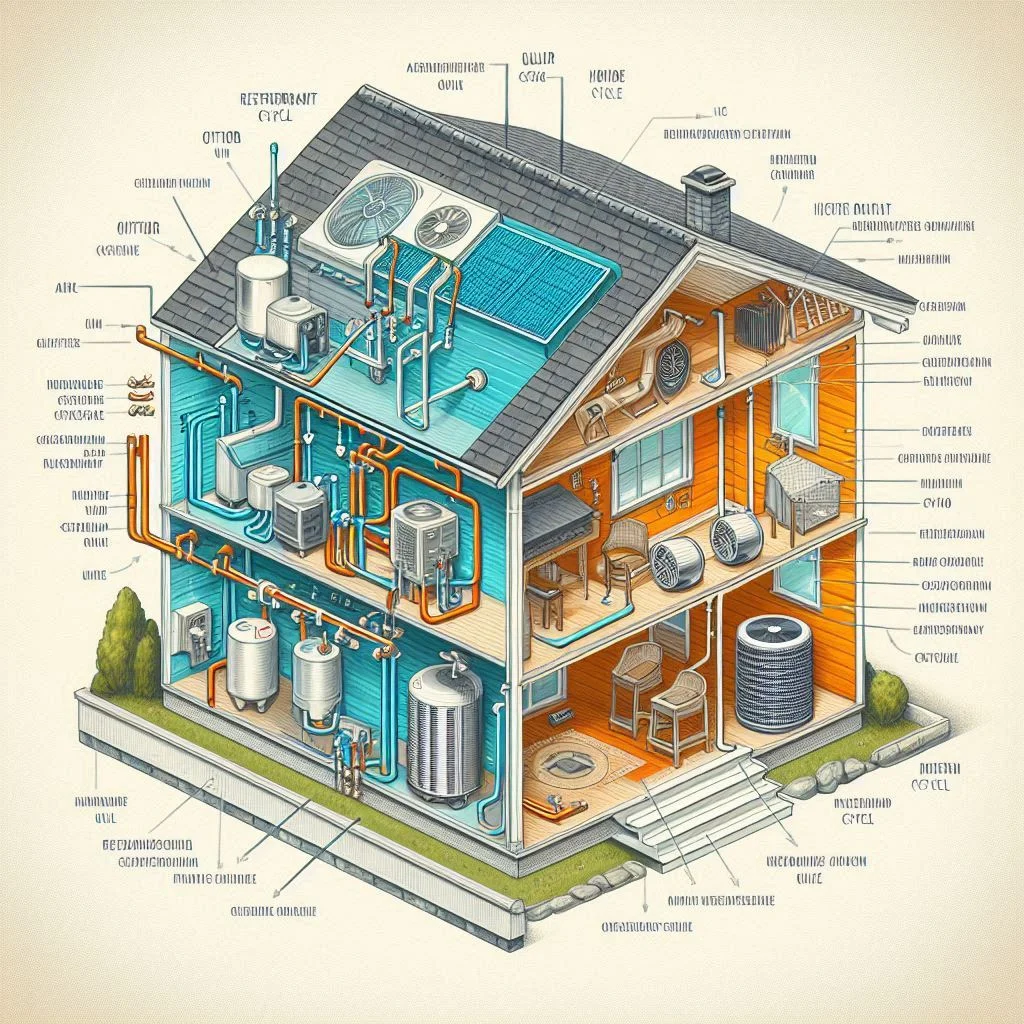
How Does a Heat Pump Compare to an AC?
When choosing between a heat pump and an air conditioner in California, several factors should be considered, including energy efficiency, costs, and long-term benefits.
Longevity: Heat pumps typically have a longer lifespan than air conditioners, averaging around 15 to 20 years with proper maintenance. Air conditioners, in contrast, usually last between 10 and 15 years. The extended lifespan of a heat pump makes it a good investment, especially for homes where both heating and cooling are needed.
Efficiency: Heat pumps are more energy-efficient than traditional air conditioners, as they do not generate heat but rather transfer it. This process requires less energy compared to generating heat through combustion or electrical resistance, making them a more eco-friendly option. ACs, while efficient at cooling, do not offer the heating functionality that heat pumps provide.
In California, where temperatures can fluctuate between hot summers and cooler winters, a heat pump’s ability to both cool and heat a home can save energy and money, especially for areas with milder winters.
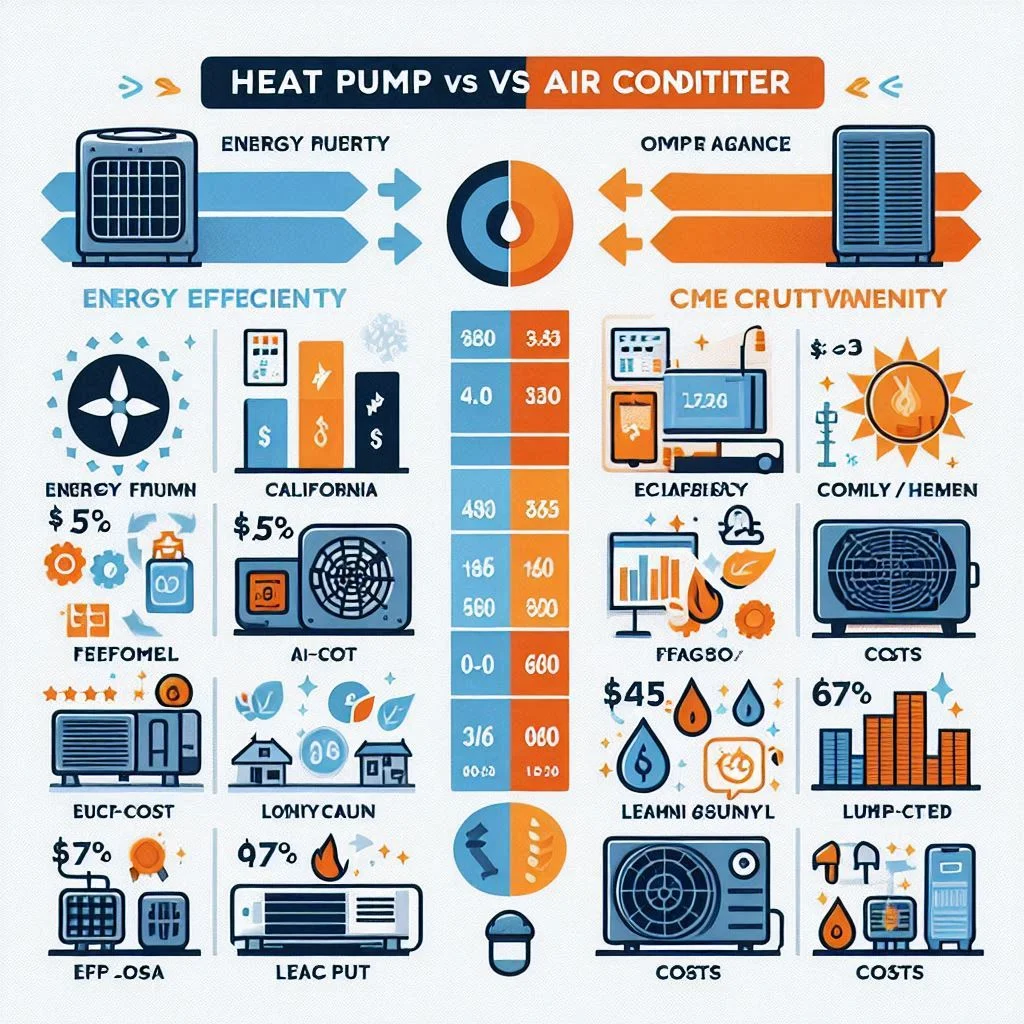
Why Choose a Heat Pump for Your California Home?
Heat pumps are perfect for California homes, particularly in areas with mild winters. They provide consistent comfort year-round without the need for separate heating and cooling systems. They also offer superior energy efficiency, lower operating costs, and contribute to reducing your carbon footprint by using renewable energy sources. With the potential for tax credits and rebates for energy-efficient systems, choosing a heat pump can also be a financially wise decision.
Understanding the Climate in California for Heat Pumps and Air Conditioners
California is known for its diverse climate, which includes everything from hot, dry summers to mild, cooler winters. When it comes to home heating and cooling, the choice between a heat pump and an air conditioner is heavily influenced by the region’s climate patterns. Understanding how each system performs in this environment can help homeowners make the most informed decision for their needs.
Air conditioners are designed to cool homes by removing heat from the interior and releasing it outside. This makes them ideal for the hot, dry summer months common in many parts of California, including areas like Los Angeles, Sacramento, and the Inland Empire. During the summer, the need for cooling is constant, and a traditional AC unit can provide quick and efficient relief from the heat.
Heat pumps, on the other hand, are well-suited for California’s more moderate climate, where temperatures rarely dip too low in the winter. A heat pump not only cools your home during the summer but can also heat it during cooler months by transferring heat from the outside air into the home. This dual-functionality makes heat pumps a smart choice for areas where both heating and cooling are required but the winters are not harsh.
In coastal and inland regions of California, a heat pump can provide efficient and cost-effective year-round comfort. However, for areas with extremely hot summers, a traditional AC might be preferable due to the higher cooling demands. Heat pumps shine in areas with a balance of heating and cooling needs, such as in parts of Northern California or coastal communities.
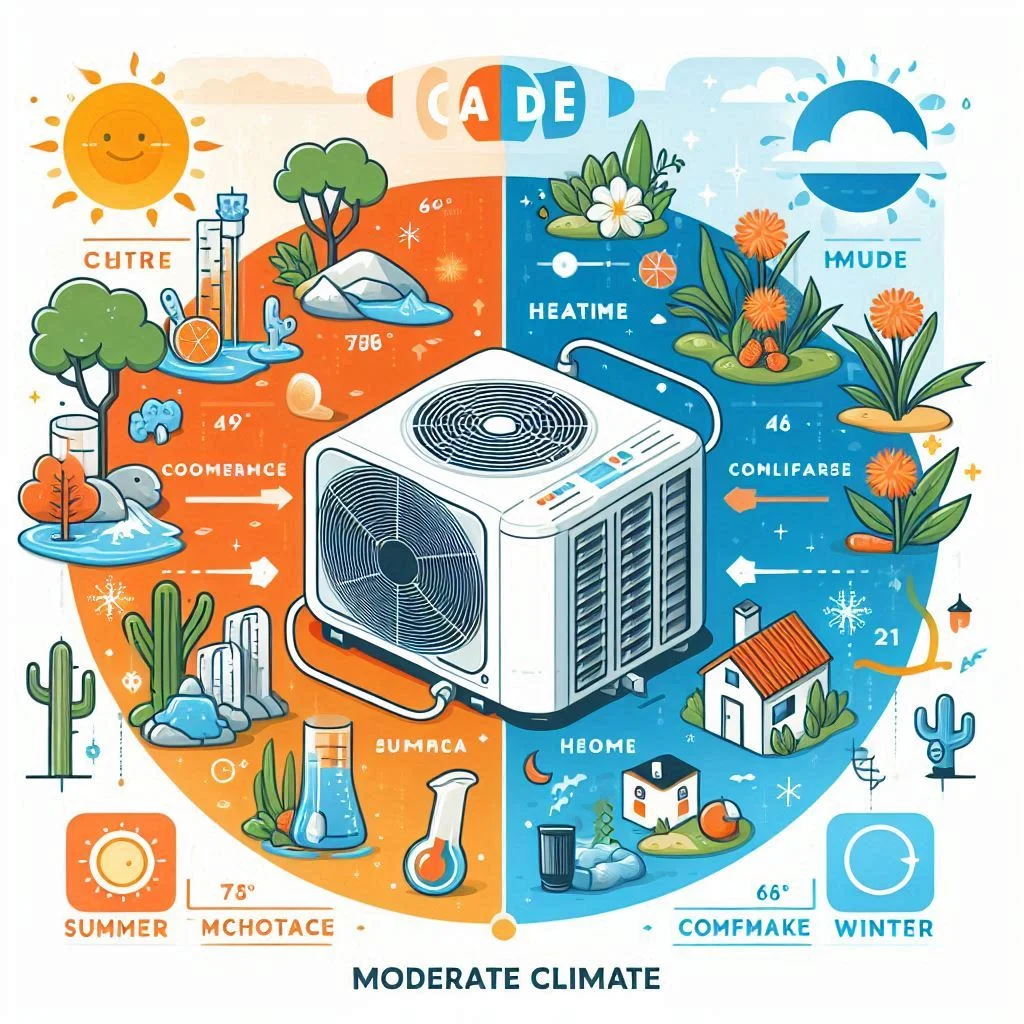
Why Is a Heat Pump Suited for California’s Climate?
California’s climate is ideal for a heat pump because of its relatively mild temperatures throughout the year. Heat pumps excel in climates where winters are not too cold and summers are hot, but not excessively so. This makes them particularly effective for regions like Northern California, coastal areas, and valley regions, where the temperature rarely drops below freezing.
In California, where energy efficiency is a priority due to the state’s environmental goals, heat pumps stand out as an excellent solution. Unlike traditional heating systems, such as furnaces, which require energy to generate heat, heat pumps simply transfer heat, making them much more energy-efficient. This is a major advantage in California, where residents are encouraged to reduce their carbon footprint and lower energy consumption.
Benefits of Heat Pumps in California’s Climate:
- Energy Efficiency: Heat pumps are more efficient than traditional heating methods because they don’t generate heat; they simply move it. This leads to lower utility bills.
- Dual Functionality: A heat pump offers both cooling and heating capabilities, which is perfect for California’s fluctuating temperatures, allowing homeowners to manage indoor comfort year-round.
- Lower Environmental Impact: By reducing energy consumption, heat pumps help reduce greenhouse gas emissions, making them an environmentally friendly choice for eco-conscious Californians.
- Long-Term Savings: With tax credits and rebates available for energy-efficient installations, heat pumps can offer substantial savings over time.
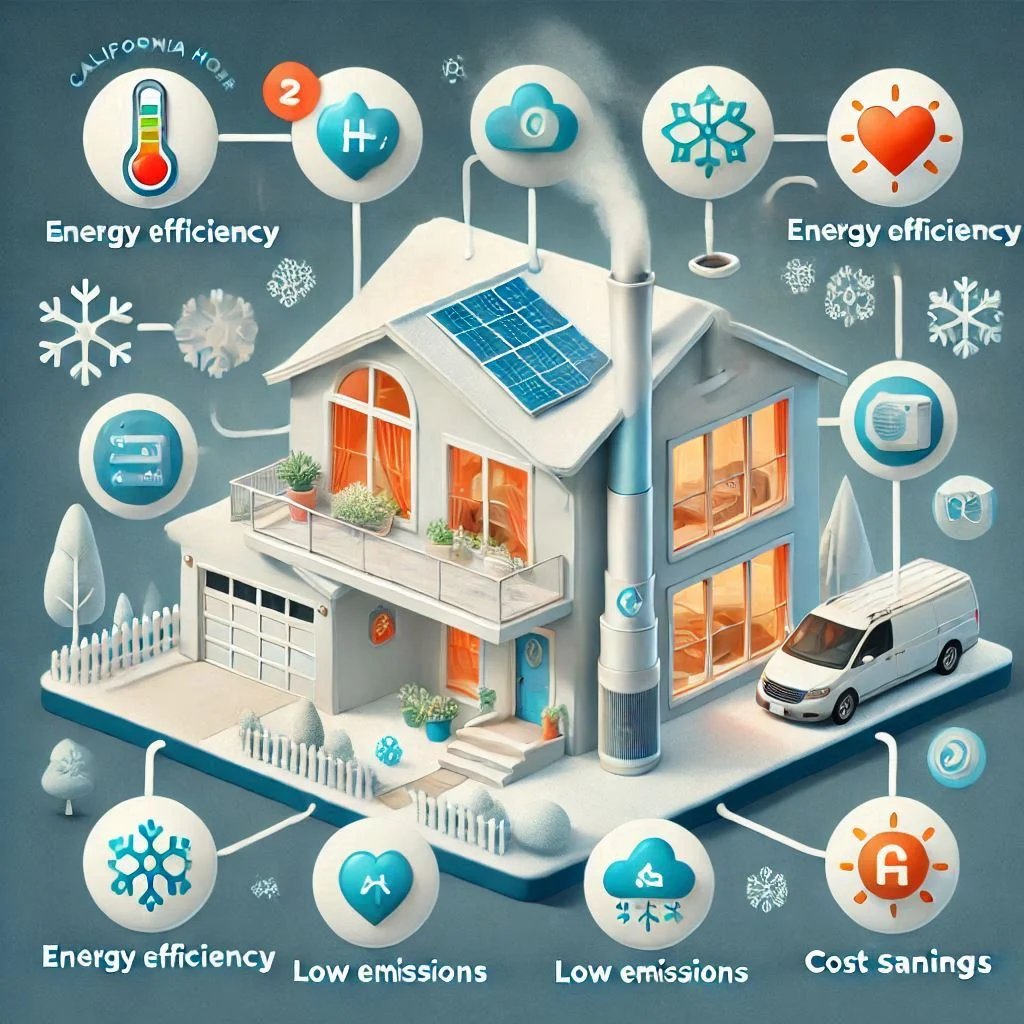
Benefits of Heat Pumps and AC in California
Both heat pumps and air conditioners have their own advantages depending on your specific climate zone within California. Understanding these benefits can help you make a decision based on your needs.
Benefits of Heat Pumps in California:
- Cost-Effective for Mild Winters: In areas with mild winters, such as coastal regions or Northern California, heat pumps can provide sufficient warmth during cooler months without the high costs associated with heating systems like gas or electric furnaces.
- Improved Air Quality: Heat pumps have built-in air filtration systems that can improve indoor air quality by removing dust, allergens, and pollutants. This is particularly beneficial for people with allergies or respiratory conditions.
- Lower Operating Costs: Since heat pumps are more energy-efficient than traditional air conditioning and heating systems, they tend to have lower operating costs. This makes them a cost-effective choice for homeowners looking to save money in the long term.
Benefits of Air Conditioners in California:
- High Cooling Capacity: Air conditioners are better suited for areas with intense heat and high cooling demands. In places like Southern California, where summer temperatures can regularly reach 100°F or more, a traditional AC may be more effective at providing quick relief from extreme heat.
- Proven Technology: Air conditioners have been used for decades and are a tried-and-true method for keeping homes cool. They are often a preferred choice for those who prioritize cooling and have separate heating systems in place.
- Availability of Models: There are many different types of air conditioners available, from window units to central systems, allowing homeowners to choose based on the size of their home and budget.
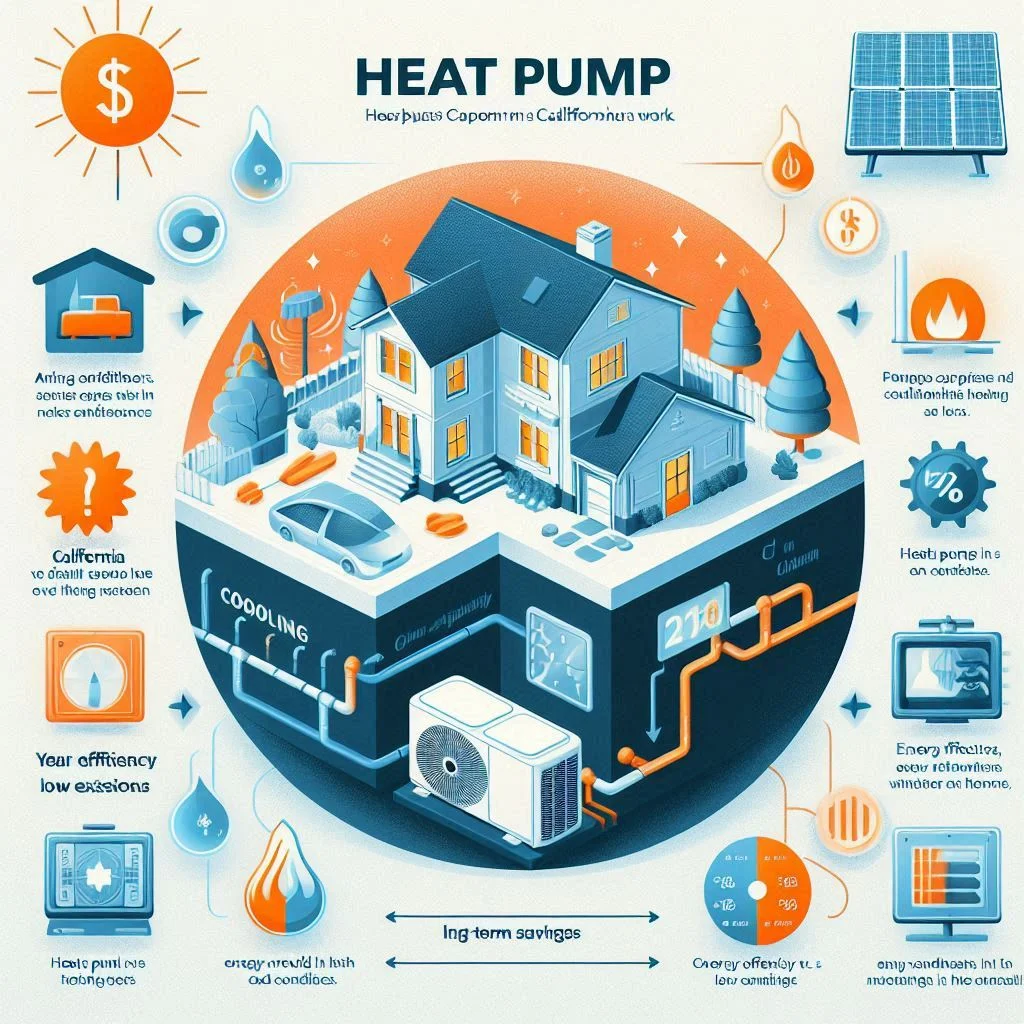
Factors to Consider When Choosing Between a Heat Pump and an AC in California
When choosing between a heat pump and an air conditioner (AC) for your California home, several factors need to be evaluated, including your region’s climate, the energy efficiency of each system, and your long-term needs for heating and cooling. While both systems serve to regulate your home’s temperature, they do so in different ways that can significantly impact your comfort and energy bills.
California’s diverse climate means that homeowners must consider how their choice will perform in both hot summers and mild winters. Some areas experience extreme heat during summer, while others require heating during the cooler months. Below, we’ll explore the key factors you should consider when selecting the right HVAC system for your California home.
Longevity and Efficiency of Heat Pumps vs. ACs
Longevity:
One of the main considerations when choosing an HVAC system is how long it will last. Both heat pumps and air conditioners have relatively long lifespans, but heat pumps tend to last a little longer, especially when properly maintained.
- Heat Pumps: On average, a heat pump lasts between 15 to 20 years. This longer lifespan is primarily due to the system’s dual functionality—cooling in summer and heating in winter—reducing wear and tear compared to a single-function system. Heat pumps have fewer components dedicated only to heating or cooling, making them more robust.
- Air Conditioners: Traditional air conditioners typically last between 10 and 15 years. While they have a slightly shorter lifespan than heat pumps, they are still reliable for long-term cooling, especially in regions where heating is not needed.
Efficiency:
Both systems are designed to keep your home comfortable, but their energy efficiency varies based on how they operate.
- Heat Pumps: Heat pumps are known for their energy efficiency because they don’t generate heat; they transfer it. This requires less energy and results in lower operating costs. For cooling, a heat pump works similarly to an AC unit, and for heating, it draws heat from the outside air—even in cooler temperatures—making it highly efficient for California’s moderate winters. Heat pumps are especially beneficial in regions like Northern and Coastal California, where temperatures don’t frequently drop below freezing.
- Air Conditioners: Air conditioners are efficient at cooling but don’t offer the same energy savings as heat pumps when it comes to heating. ACs require more energy to produce cooling through a refrigerant cycle, making them less efficient than heat pumps in terms of overall energy consumption. For homeowners in areas with high summer temperatures, an AC may provide more immediate and powerful cooling, but it won’t save energy when it comes to heating.
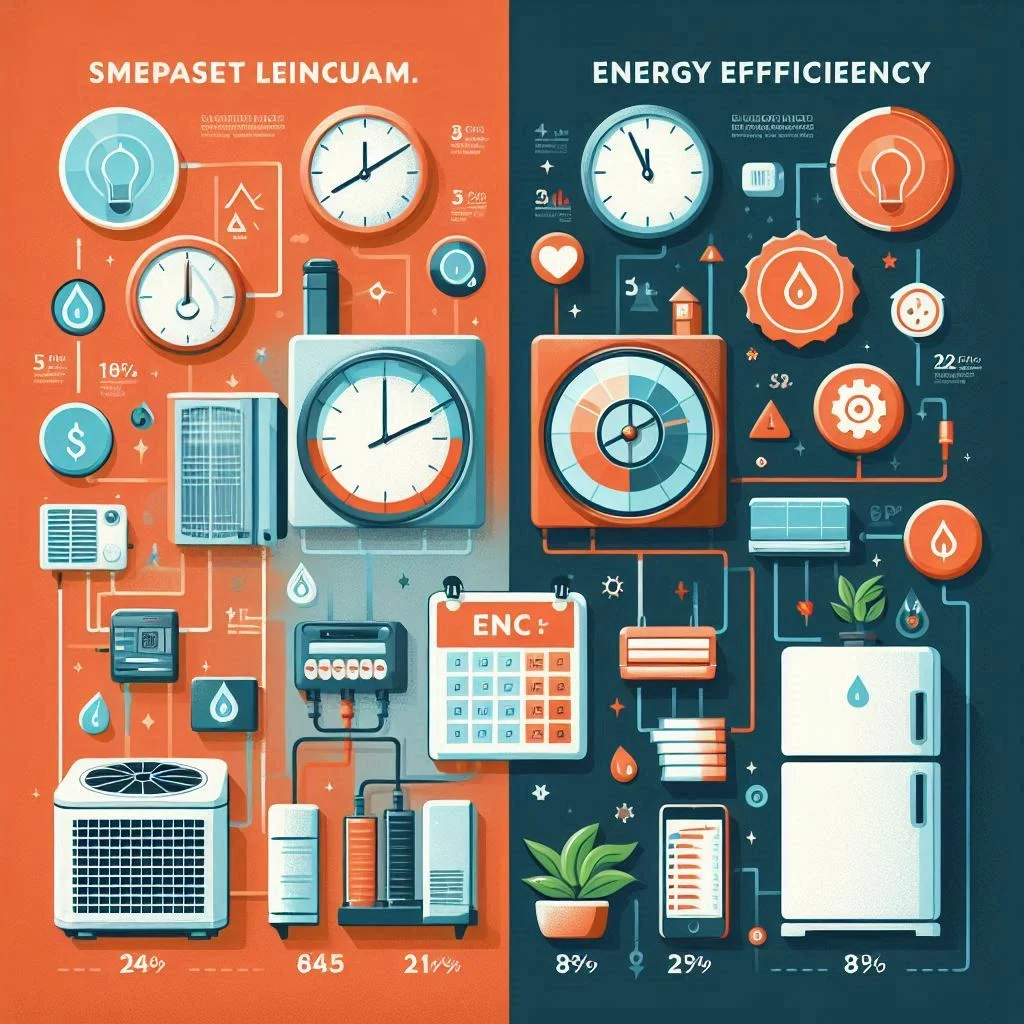
Cooling vs. Heating Needs for Your California Home
When choosing between a heat pump and an air conditioner, it’s crucial to assess your cooling and heating needs. California’s climate varies greatly from region to region, meaning that different areas have different demands for cooling and heating.
Cooling Needs:
- Southern California: Areas like Los Angeles and San Diego are known for their hot and dry summers. For these regions, air conditioners are often the better option due to the extreme heat during summer months. Air conditioners can quickly and efficiently cool your home in these sweltering temperatures. For homeowners who live in areas with high summer temperatures and low heating needs, an AC system might be a better fit.
- Inland Areas: In places like the Central Valley or Inland Empire, where summer temperatures soar well over 100°F, air conditioners are highly effective at maintaining comfortable indoor temperatures. However, because these areas can have cooler evenings, a heat pump may also be a good choice to manage both cooling and mild heating needs, without the need for separate heating systems.
Heating Needs:
- Coastal and Northern California: Coastal areas, such as San Francisco, and Northern California have cooler temperatures year-round. While they don’t experience harsh winters, the temperatures can dip low enough that heating is necessary. In these regions, a heat pump is an excellent choice, as it provides both heating and cooling, making it ideal for homes where heating is only needed occasionally but where cooling is still important during hot months.
- Mountainous and High-Altitude Areas: In places like the Sierra Nevada or the foothills, where winter temperatures can drop significantly, homeowners may require a more robust heating system. While a heat pump can still work efficiently, areas that experience long and cold winters may benefit from a traditional heating system such as a furnace or a dual-fuel heat pump, which combines the benefits of a heat pump with the extra power of a backup furnace for colder months.
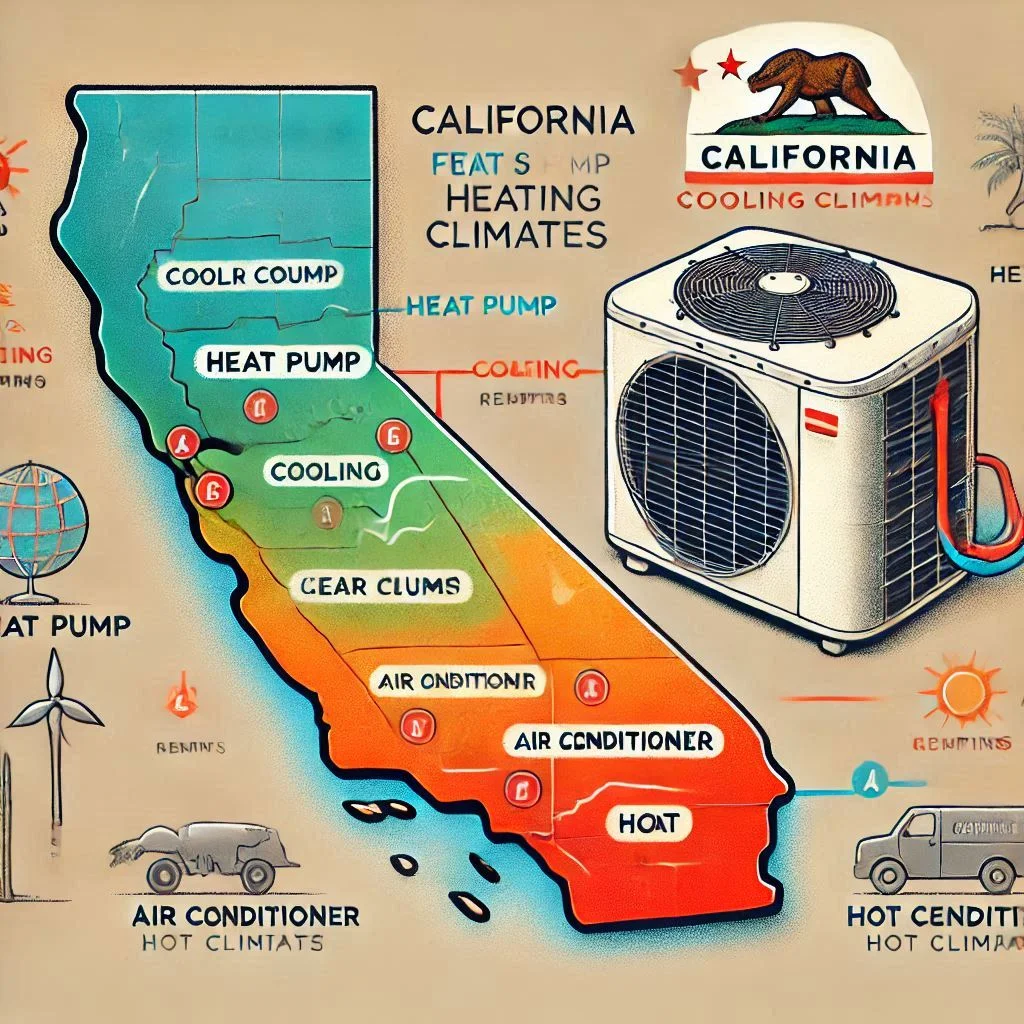
Choosing the Right System Based on Your Needs
Ultimately, the decision to install a heat pump or air conditioner depends on your location in California and your specific needs:
- If your primary concern is cooling during long, hot summers, an AC may be the right choice, especially for regions like Southern California.
- If you’re looking for a dual-function system that can handle both cooling and mild heating, a heat pump may be the perfect solution, particularly for areas like Coastal California and parts of Northern California.
Both systems come with their own set of advantages, and assessing your specific cooling and heating demands will help you determine which one is best suited to your California home.
Who Should Choose a Heat Pump vs. an Air Conditioner?
Choosing the right HVAC system for your home is a big decision, especially when considering the benefits of a heat pump versus a traditional air conditioner (AC). Both systems are designed to keep your home comfortable, but they serve different purposes, and some homeowners will benefit more from one over the other depending on specific factors such as climate, energy efficiency, and year-round comfort needs.
In this section, we will explore who should choose a heat pump and who might be better off sticking with a traditional air conditioner to optimize both comfort and savings.
Who Might Benefit from a Heat Pump?
A heat pump offers year-round comfort and can handle both cooling and heating needs, making it an ideal choice for homeowners in areas where temperatures vary seasonally but don’t drop to extreme lows. Below are specific scenarios and types of homeowners who would benefit most from a heat pump:
1. Homeowners in Moderate Climates
If you live in a region with mild winters and hot summers, a heat pump is a great choice. California’s Coastal and Northern areas, for example, have moderate winter temperatures, where the need for extreme heating is minimal. In these regions, a heat pump can handle both cooling in the summer and heating in the winter, making it a versatile and energy-efficient option.
2. Those Seeking Energy Efficiency
Heat pumps are known for their energy efficiency. They work by transferring heat rather than generating it, which requires less energy compared to traditional heating systems. If you are looking to reduce your energy consumption and lower your utility bills while maintaining year-round comfort, a heat pump is a smart choice.
- Energy-efficient cooling: During summer, a heat pump functions like an AC, keeping your home cool while using minimal energy.
- Cost-effective heating: During winter, it uses ambient outdoor air to heat your home, which is more efficient than using electrical resistance heating or a gas-powered furnace.
3. Homeowners Looking to Replace Multiple Systems
For those with separate cooling and heating systems, installing a heat pump can replace both systems with one, offering a streamlined and cost-effective solution. If you currently have a traditional air conditioner for cooling and a furnace for heating, switching to a heat pump can simplify maintenance and lower long-term operating costs.
4. Environmentally-Conscious Homeowners
If you are environmentally conscious and want to reduce your carbon footprint, a heat pump is a more sustainable option compared to traditional AC and heating systems. Heat pumps have a lower environmental impact, especially when paired with renewable energy sources such as solar power.
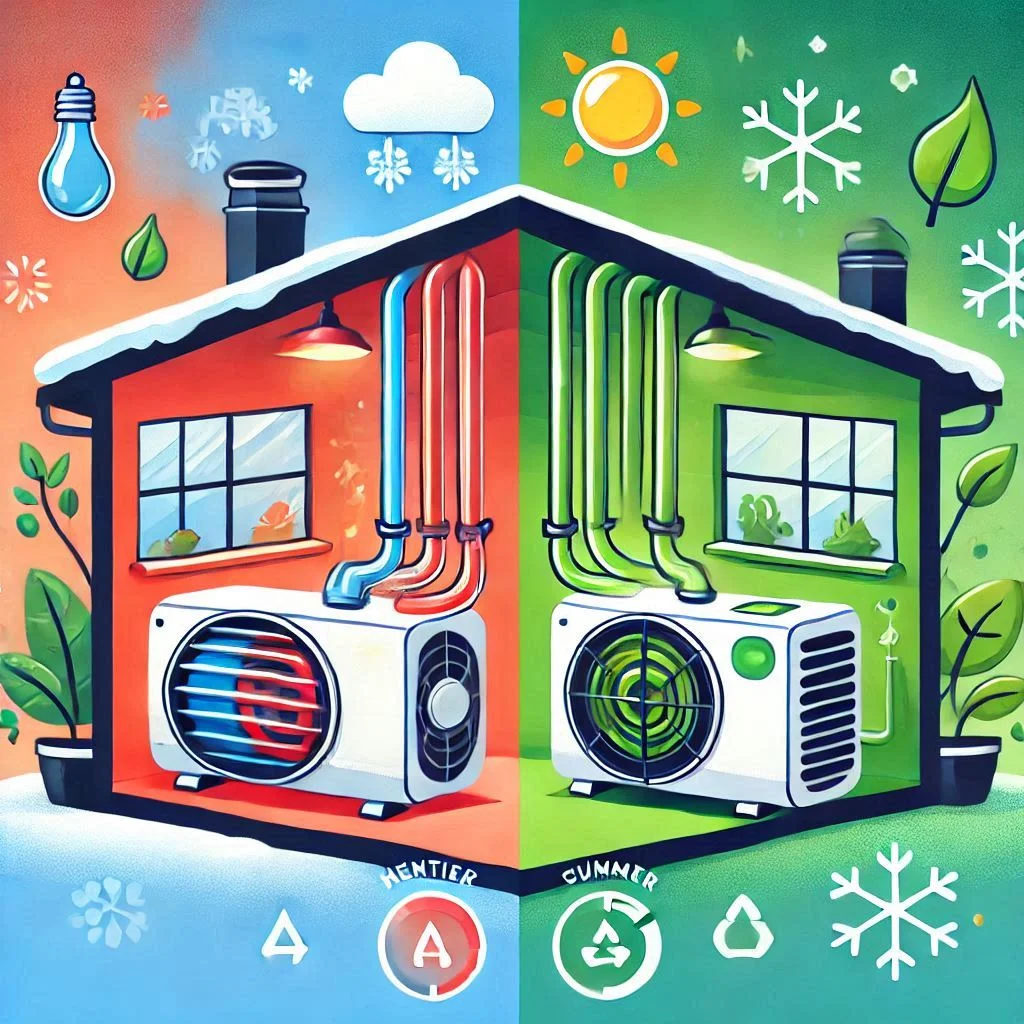
Who Should Stick With a Traditional AC?
While a heat pump offers many advantages, there are scenarios where a traditional air conditioner is still the better choice for homeowners. Below are some factors that may influence your decision to stick with a traditional AC instead of opting for a heat pump:
1. Homeowners in Hotter Climates with Minimal Heating Needs
If you live in areas with extremely hot summers and mild winters, a traditional air conditioner might be the best option. Regions like Southern California experience long, hot summers, and an AC will provide powerful cooling capabilities for high temperatures. Since heating is rarely needed, a traditional air conditioner is a straightforward and effective choice.
2. People Who Don’t Need Heating
If your home is located in an area where winter temperatures rarely dip below freezing, you may not need the additional heating capabilities of a heat pump. For example, in desert or coastal regions of California where winters are mild, an AC system may be all you need to stay comfortable. In these cases, investing in a heat pump might be unnecessary, as the extra heating function would not be used often.
3. Homeowners Who Prioritize Cooling Performance
If your primary need is cooling and you want an air conditioning unit that can deliver high performance in extreme heat, a traditional AC may be the better choice. Modern air conditioners are designed to handle high cooling loads efficiently and quickly.
- Faster cooling: Air conditioners tend to cool the air faster than heat pumps, which might be beneficial during intense heat waves.
4. Budget-Conscious Homeowners
While heat pumps offer energy efficiency, they can have a higher upfront installation cost compared to traditional air conditioners. If you don’t need the heating function and are primarily concerned with cooling, a traditional AC system might be a more cost-effective choice, particularly in areas where heating is not necessary.
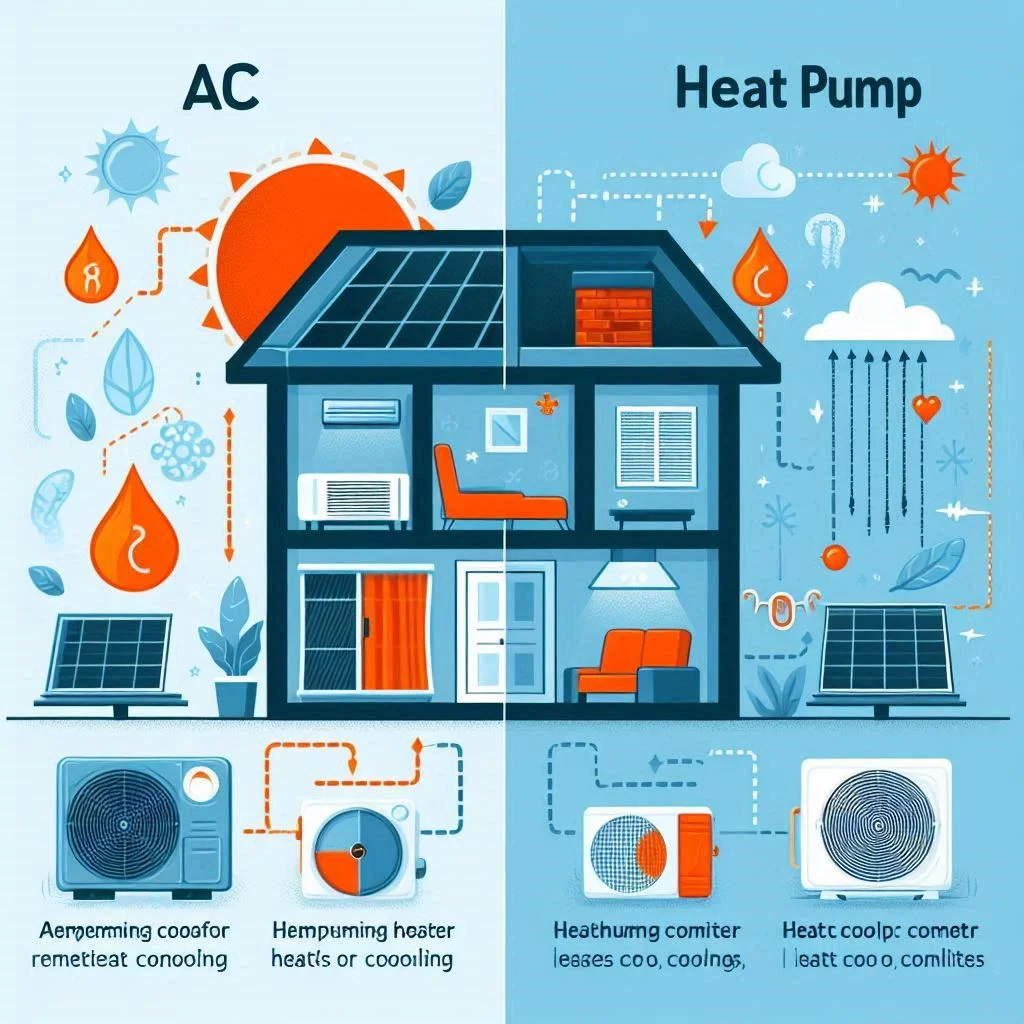
Making the Right Decision
Ultimately, deciding between a heat pump and a traditional air conditioner depends on your unique needs and the climate of your region.
- If your home requires both cooling and heating or if you live in a moderate climate where both systems are necessary, a heat pump offers year-round comfort and efficiency.
- If you live in an area with extremely hot summers and little need for heating, a traditional AC may still be the better choice for efficient cooling at a lower initial cost.
By considering your specific needs and the performance requirements of each system, you can ensure that you make the best decision for your home, your budget, and your long-term comfort.
Heat Pump and Air Conditioner Installation in California: What to Expect
When it comes to installing a heat pump or air conditioner in your California home, there are several key factors that homeowners should be aware of. The installation process can vary based on the type of system, the complexity of your home’s infrastructure, and local climate conditions. In this section, we will explain the steps involved in installing a heat pump and air conditioner, the expected duration of installation, and the complexity of the tasks involved. This guide will also answer some of the most common questions to help you prepare for the process.
How Long Does Installation Take?
The installation time for both heat pumps and air conditioners can vary depending on the specific needs of your home, the type of system you are installing, and the condition of your existing infrastructure. Here’s a breakdown of what to expect:
1. Air Conditioner Installation Time
Installing a traditional central air conditioner typically takes between 6-8 hours for an experienced technician to complete. The time can vary depending on factors like:
- Existing ductwork: If your home already has existing ductwork in place, installation will be faster. However, if new ductwork needs to be installed, the process may take longer.
- Type of AC system: The time also depends on whether you’re installing a standard split-system air conditioner or a more advanced ductless mini-split system. Ductless systems tend to take longer due to the need to install multiple units and additional piping.
2. Heat Pump Installation Time
Installing a heat pump can take a similar amount of time, but there are a few differences to consider. On average, heat pump installations take 8-12 hours. The time can vary based on the following factors:
- Heating and cooling needs: If your heat pump needs to handle both heating and cooling for a large home, additional time may be required for proper configuration.
- Compatibility with existing systems: If you are replacing an older system (like a furnace or traditional air conditioner), additional time may be required to remove the old system and ensure the new heat pump is properly integrated with your home’s heating and cooling setup.
- Complexity of the installation: If your home requires special modifications, such as electrical upgrades or enhanced insulation for optimal efficiency, it may take longer to complete the installation.
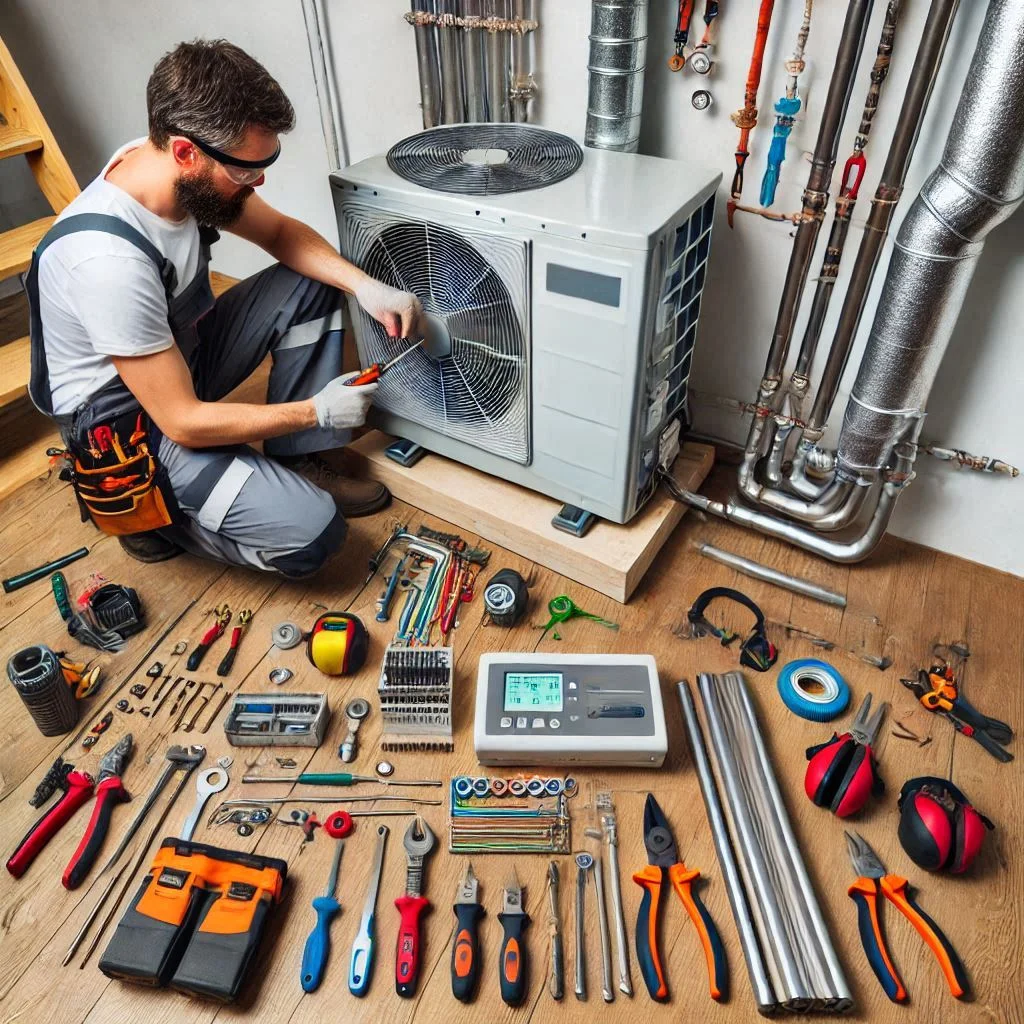
3. Scheduling and Preparation
It’s important to keep in mind that while installation typically takes a day, scheduling and preparation can take longer. Depending on demand, you may need to book the installation in advance. Furthermore, you will need to ensure that your home is ready for installation, which includes clearing space around the areas where the system will be installed.
Are Heat Pump Installations More Complex Than AC Installations?
The installation of a heat pump is generally more complex than that of a traditional air conditioner, although both systems share similarities. Below, we’ll explain why heat pump installation might require more expertise and additional steps.
1. Dual Functionality
One of the main reasons heat pump installation is more complex than that of an air conditioner is due to its dual functionality. Unlike an air conditioner, which only cools, a heat pump must be installed to handle both heating and cooling. This requires additional considerations:
- System Design: The technician must ensure that the heat pump is sized correctly for both heating and cooling, which involves calculating the appropriate capacity based on your home’s layout, insulation, and climate needs.
- Advanced Configuration: The heat pump must be properly configured for both functions. This can involve setting up advanced controls for switching between cooling and heating modes as needed.
2. Additional Components for Heating
When installing a heat pump, there are additional components involved in the heating function. For example, the heat pump may need to be connected to an auxiliary heating source to handle particularly cold temperatures. The installation process for this can require more time and expertise than the installation of an air conditioner, which only focuses on cooling.
3. Electrical and Ductwork Modifications
Both systems require electrical connections, but heat pumps often require specialized electrical work to ensure that the unit can handle both heating and cooling loads. Additionally, ductwork modifications may be necessary, especially in cases where the existing ducts are not designed for the airflow demands of a heat pump. This can make the installation more complex compared to a typical air conditioner.
4. System Efficiency Settings
Heat pumps require specific calibration to operate efficiently in both cooling and heating modes. Technicians will need to fine-tune the system to ensure it works as intended, which may take more time compared to an air conditioner installation that only needs cooling optimization.
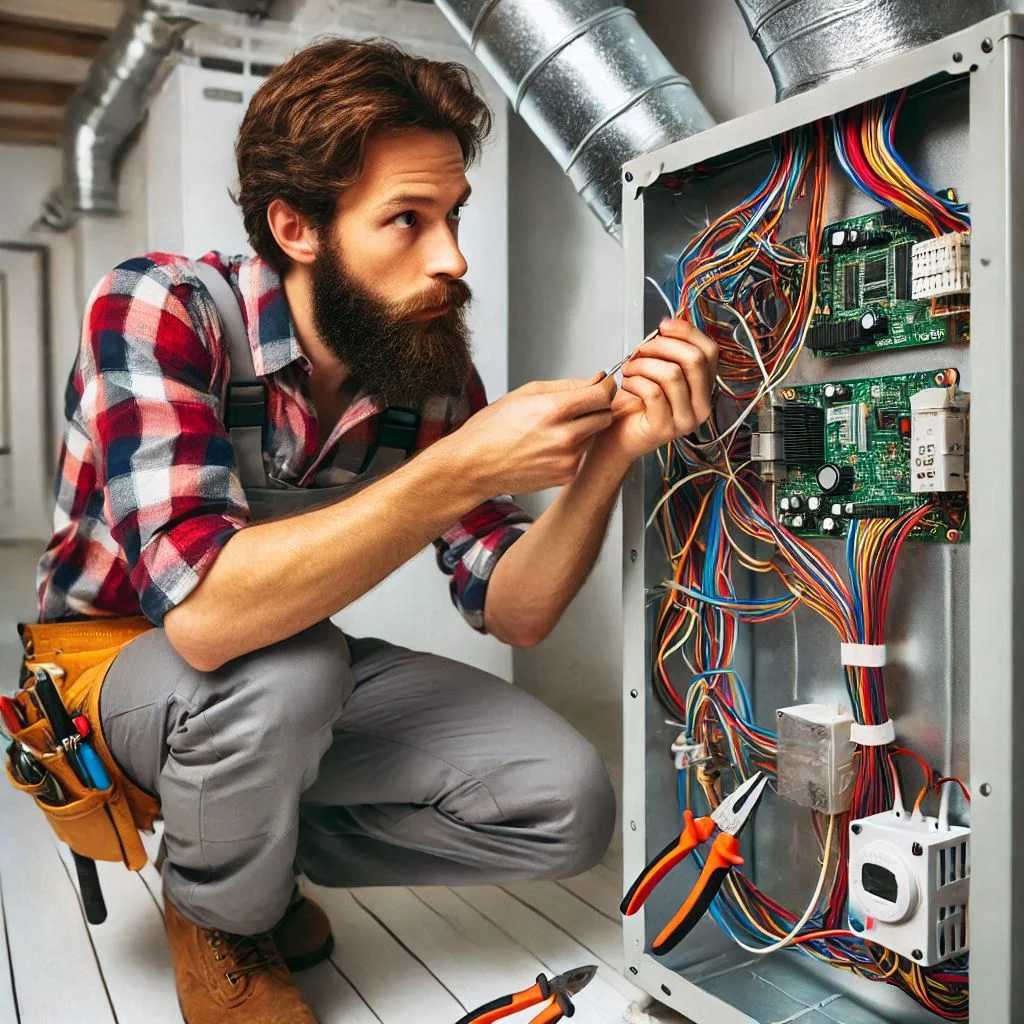
5. Cost and Complexity of Installation
Due to the added complexity of installing both heating and cooling components, heat pump installations tend to have a higher upfront cost compared to traditional AC installations. However, the long-term energy savings may offset the higher initial cost, making it a worthwhile investment for many homeowners.
What to Expect After Installation
Once your heat pump or air conditioner is installed, the technician will:
- Perform a final check to ensure the system is running efficiently.
- Provide instructions on system maintenance and energy-saving tips to help extend the life of the equipment and keep your energy bills low.
- Offer advice on how to schedule regular maintenance to ensure optimal performance.
For heat pumps, additional checks will be made to verify that the heating function is working properly, ensuring that the system can handle both summer and winter temperatures with ease.
Frequently Asked Questions about Heat Pumps and Air Conditioners for California Homes
When it comes to installing or upgrading your heating and cooling system in a California home, understanding the differences between heat pumps and air conditioners is crucial. Homeowners often have many questions regarding installation, performance, and costs. In this section, we will answer the most frequently asked questions to help you make an informed decision about which system is right for your home.
Are Heat Pump Installations More Complex?
Yes, heat pump installations tend to be more complex than traditional air conditioner installations due to several factors. Here’s why:
1. Dual Functionality
Heat pumps are capable of both heating and cooling, whereas air conditioners only cool. This dual functionality means that the system needs to be installed and configured to handle both seasonal demands effectively. For instance, a heat pump requires additional electrical wiring, specialized equipment, and careful consideration of both the heating and cooling needs of the home.
2. Compatibility with Existing Systems
If you’re replacing an old system, such as a furnace or air conditioner, the heat pump may need additional modifications to existing ducts or electrical wiring to function properly. This makes the installation process more involved than a simple air conditioner replacement.
3. Special Considerations for Efficiency
Heat pumps require additional calibration and setup to ensure maximum energy efficiency in both heating and cooling modes. If your home needs both systems (heating and cooling), the setup must be fine-tuned, increasing the time and expertise required for installation.
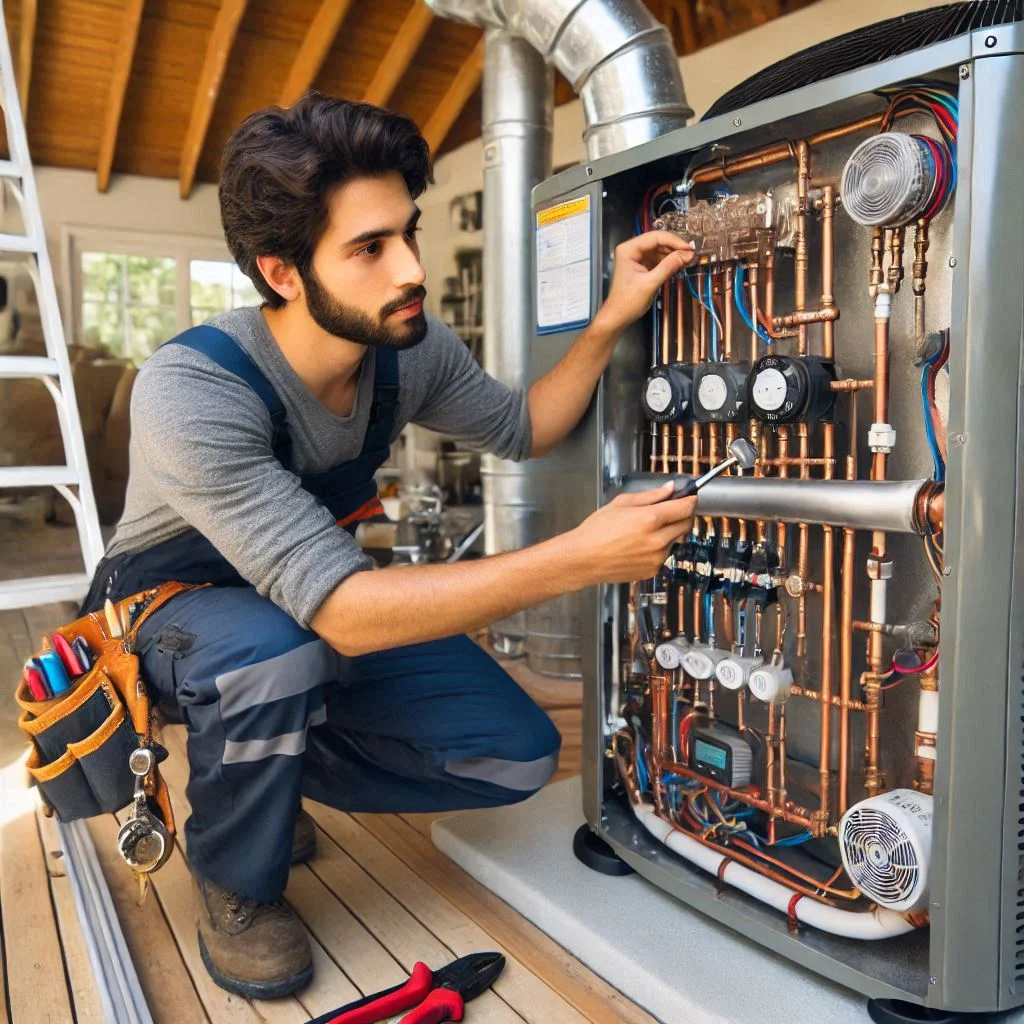
How Long Does a Heat Pump Installation Take?
The installation time for a heat pump can vary, but on average, it takes between 8 to 12 hours for the installation to be completed. The time required for installation can be influenced by several factors:
1. Existing System and Infrastructure
If you’re replacing an old system, such as a furnace or air conditioner, more time may be required to remove the old equipment and ensure the new heat pump is properly integrated. The ductwork and electrical system may also need modifications to support the heat pump’s dual functionality.
2. Home Size and Layout
The complexity of the installation increases with the size of your home and the specific layout. Larger homes or homes with challenging layouts may require extra time for planning and installation. Additionally, zoning and energy-efficient features may be part of the installation process, which can extend the time.
3. Permitting and Inspections
In some areas of California, you may need permits to install a heat pump or air conditioning system. Depending on local regulations, it may take extra time to get the necessary approvals and inspections.
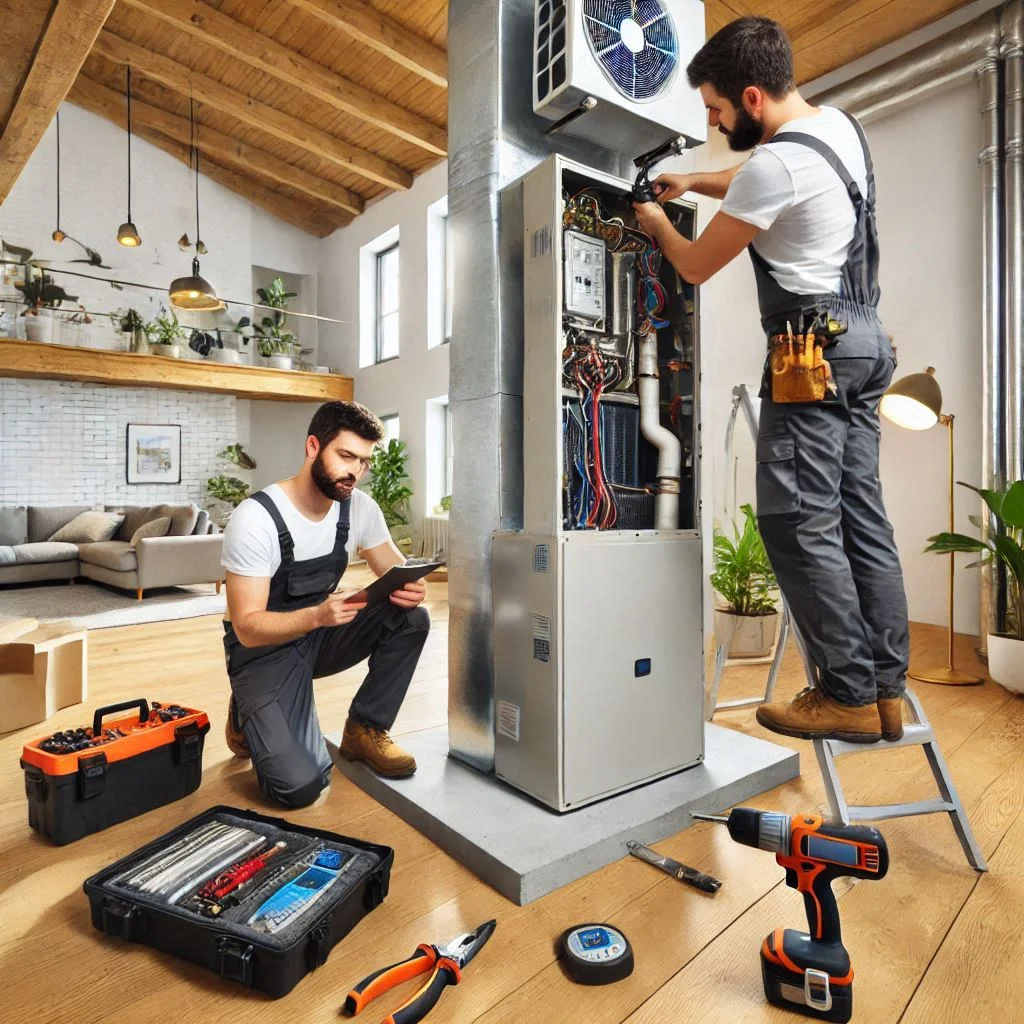
What’s the Cost Difference Between a Heat Pump and an AC?
The cost difference between a heat pump and a traditional air conditioner depends on several factors, including the size of the system, the brand, and the complexity of the installation. Here’s a breakdown:
1. Initial Purchase Price
On average, heat pumps tend to be more expensive than traditional air conditioners. The price difference can range from $1,000 to $3,000 more for a heat pump, depending on the capacity and the brand.
- Air Conditioners: Typically range from $3,000 to $7,000, including installation.
- Heat Pumps: Generally cost between $4,000 and $10,000, with installation included.
2. Installation Costs
The installation of a heat pump can be more expensive due to the complexity of the system. Air conditioner installations, on the other hand, tend to be simpler and, therefore, less costly.
3. Long-Term Savings
While heat pumps have a higher upfront cost, they provide both heating and cooling in one unit, which can result in lower energy bills compared to having separate heating and cooling systems. Over time, heat pumps can save homeowners up to 30-40% on energy bills, making the initial investment worthwhile for many. Additionally, some heat pumps qualify for energy efficiency rebates or tax incentives, further reducing the overall cost.
4. Maintenance Costs
The maintenance costs for both systems are relatively similar, but a heat pump may require more frequent servicing since it operates in both heating and cooling modes. Regular inspection and maintenance are essential for both systems to ensure optimal performance and longevity.
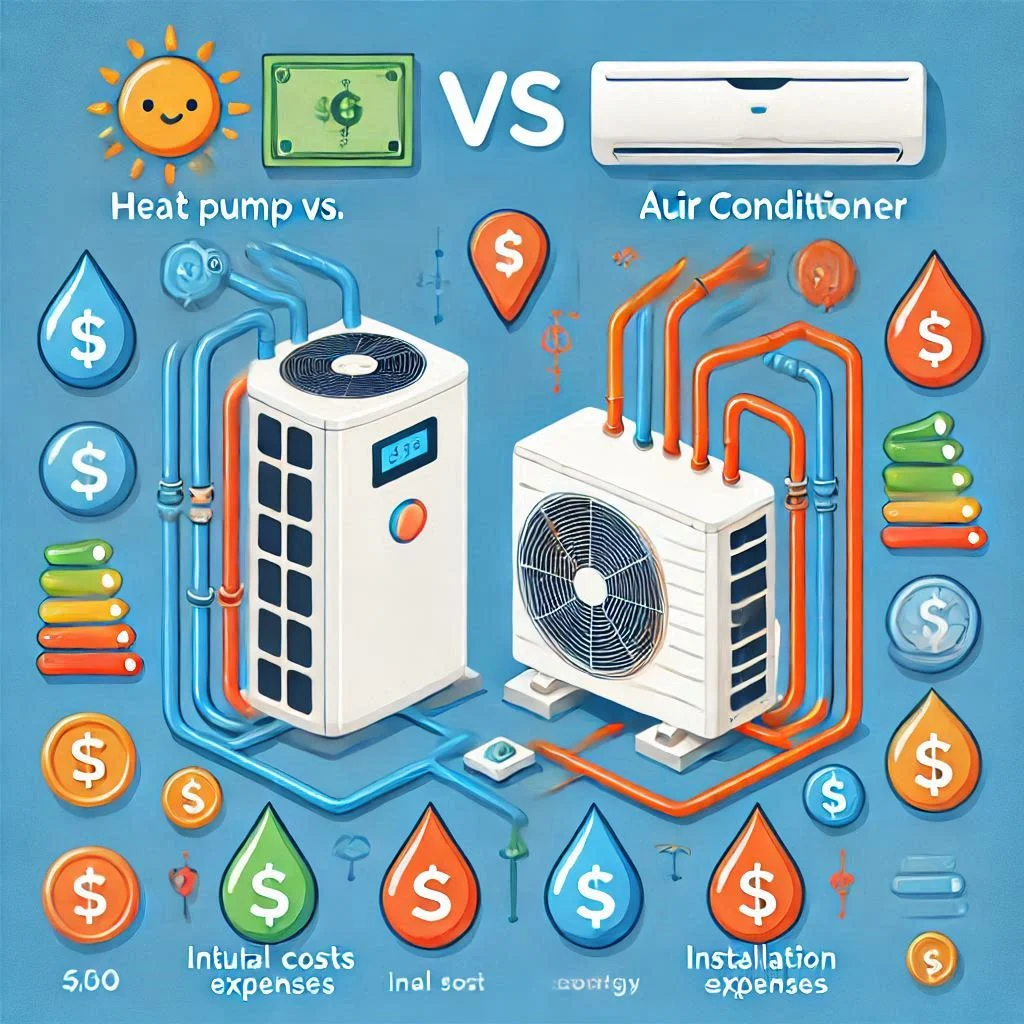
Conclusion
Choosing between a heat pump and an air conditioner for your California home requires careful consideration of several factors, including your climate, heating and cooling needs, budget, and long-term energy efficiency goals. While heat pumps offer the added benefit of year-round functionality by both heating and cooling your home, air conditioners continue to be a reliable option for purely cooling needs. Installation times, costs, and complexity also play a significant role in your decision-making process. Whether you opt for a heat pump or AC, it’s essential to consult with a professional HVAC technician to ensure that you select and install the right system for your home. At [Your Company Name], we are committed to providing expert installation, maintenance, and repair services for both heat pumps and air conditioners in California. Contact us today to learn more about how we can help you make the best decision for your home and enjoy optimal comfort year-round!

